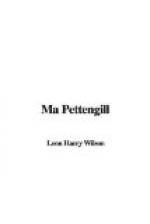Lew Wee, prized Chinese chef of the Arrowhead Ranch, had butchered, cooked, and served two young roosters for the evening meal with a finesse that cried for tribute. As he replaced the evening lamp on the cleared table in the big living room he listened to my fulsome praise of his artistry as Marshal Foch might hear me say that I considered him a rather good strategist. Lew Wee heard but gave no sign, as one set above the petty adulation of compelled worshipers. Yet I knew his secret soul made festival of my words and would have been hurt by their withholding. This is his way. Not the least furtive lightening of his subtle eyes hinted that I had pleased him.
He presently withdrew to his tiny room off the kitchen, where, as was his evening custom for half an hour, he coaxed an amazing number of squealing or whining notes from his two-stringed fiddle. I pictured him as he played. He would be seated in his wicker armchair beside a little table on which a lamp glowed, the room tightly closed, window down, door shut, a fast-burning brown-paper cigarette to make the atmosphere more noxious. After many more of the cigarettes had made it all but impossible, Lew Wee, with the lamp brightly burning, as it would burn the night through—for devils of an injurious sort and in great numbers will fearlessly enter a dark room—he would lie down to refreshing sleep. That fantasy of ventilation! Lew Wee always sleeps in an air-tight room packed with cigarette smoke, and a lamp turned high at his couchside; and Lew Wee is hardy.
He played over and over now a plaintive little air of minors that put a gentle appeal through two closed doors. It is one he plays a great deal. He has told me its meaning. He says—speaking with a not unpleasant condescension—that this little tune will mean: “Life comes like a bird-song through the open windows of the heart.” It sounds quite like that and is a very satisfying little song, with no beginning or end.
He played it now, over and over, wanderingly and at leisure, and I pictured his rapt face above the whining fiddle; the face, say, of the Philosopher Mang, sage of the second degree and disciple of Confucius, who was lifted from earth by the gods in a time we call B.C. but which was then thought to be a fresh, new, late time; the face of subtle eyes and guarded dignity. And I wondered, as I had often wondered, whether Lew Wee, lone alien in the abiding place of mad folks, did not suffer a vast homesickness for his sane kith, who do not misspend their days building up certain grotesque animals to slaughter them for a dubious food. True, he had the compensation of believing invincibly that the Arrowhead Ranch and all its concerns lay upon his own slightly bowed shoulders; that the thing would fast crumble upon his severance from it. But I questioned whether this were adequate. I felt him to be a man of sorrow if not of tragedy. Vaguely he reached me as one who had survived some colossal buffeting.




